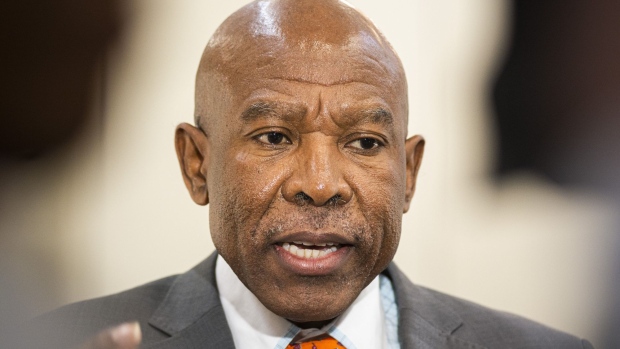Jan 26, 2023
South Africa’s Central Bank Raises Benchmark Rate to 7.25%
, Bloomberg News

(Bloomberg) -- South Africa’s central bank slowed the pace of interest-rate hikes as it slashed its economic-growth forecast for this year and warned of continuing risks to the inflation outlook.
The monetary policy committee increased the benchmark interest rate to 7.25% from 7%, Governor Lesetja Kganyago said Thursday at a briefing in Centurion near the capital, Pretoria. Only six of 21 economists surveyed by Bloomberg predicted the move, while the rest expected an increase of 50 basis points.
“The revised repurchase rate remains supportive of credit demand in the near term, while raising rates to levels more consistent with the current view of inflation and risks to it,” Kganyago said. “Guiding inflation back towards the mid-point of the target band can reduce the economic costs of high inflation and enable lower interest rates in the future.”
Three MPC members voted for the quarter-point increase and the other two preferred 50 basis points.
The rand weakened as much 0.5% after the announcement and was 0.4% weaker at 17.1851 per dollar by 5:36 p.m. in Johannesburg. Stocks rallied, with the FTSE/JSE Africa All Share Index advancing 1%. The yield on 10-year bonds was little changed, trading three points lower at 10.3%
Forward-rate agreements adjusted lower as traders reduced bets on a further tightening of monetary policy.
“This decision is less hawkish than analyst consensus, but in line with what the FRA and bond markets were pricing,” said Reezwana Sumad, a Johannesburg-based research analyst at Nedbank Ltd. “The rand could weaken temporarily on the back of this decision, but the FRA curve could move lower after today’s meeting, as it continues to price in a less-hawkish path for the repo rate relative to consensus.”
The South African Reserve Bank has delivered 375 basis points of tightening since November 2021 in response to the worst global inflation shock in a generation. Its stance meant the country hasn’t experienced target misses on the scale that some African and developed-market nations have, and interest-rate increases haven’t been as large as in some other emerging markets.
The rate of price growth has breached the 6% upper limit of its target for seven straight months and is only seen firmly back at the midpoint from the second half of 2024. The key rate is now at a level last seen more almost 14 years ago, when the MPC was also trying to guide consumer-price growth back below the 6% ceiling of its target band.
While the Reserve Bank left its forecast for headline inflation this year unchanged at 5.4%, it raised the estimate to 4.8% in 2024 from 4.5% previously. The MPC sees inflation returning to the target midpoint of 4.5% in the fourth quarter of next year — that’s five quarters later than it expected in November and could force it to keep interest rates higher for longer.
Prospects for economic growth appear even more uncertain than normal, Kganyago said.
The central bank cut its forecast for economic growth this year to 0.3%, from 1.1% previously, because of extensive power outages — known locally as load-shedding — that have been implemented by state power utility Eskom Holdings SOC Ltd. Kganyago said the blackouts will cut an estimated 2 percentage points off growth this year.
“A material reduction in load-shedding would significantly raise growth,” he said. The economy is seen expanding 0.7% in 2024, compared with a prior estimate of 1.4%.
--With assistance from Alex Tribou, Colleen Goko and Adelaide Changole.
(Updates with detail, comment throughout)
©2023 Bloomberg L.P.





